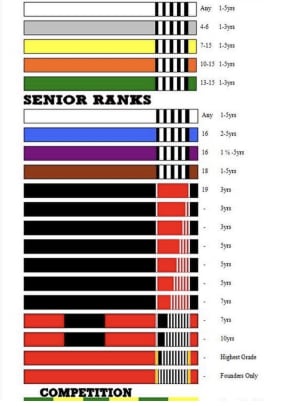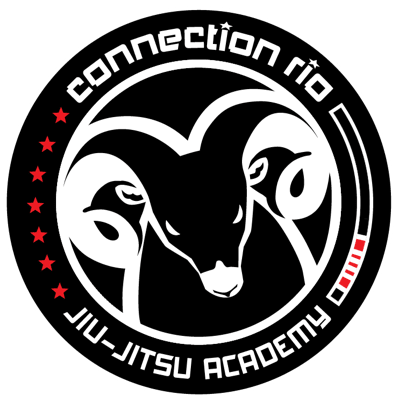
In a recent social media post by renowned Jiu-Jitsu master Fabio Santos; a timeline was displayed showing an old school, gold standard of what a BJJ belt timeline should portray. This is often called into question as the commercialization of our beloved art suave has incentivized many black belts to hurriedly rank their students with the hope of holding a higher student retention rate at their academies. As has been pointed out by many prominent BJJ figures around the world, this act has watered down the high standard from which BJJ was once upheld. This effects practitioners in more ways than one. Beginning with the competitions and how current days athletes are less likely to compete out of fear of not being able to uphold and represent the rank of belt tied around their waist in a competition. Following inability to represent their rank comes a false sense of security in effectively being able to use the martial art of BJJ on the job or as a form of self defense. Last is a lessening of the sense of achievement that comes along with those who have dedicated their time to becoming proficient at BJJ, putting in the blood, sweat and tears that are associated with earning a belt under a high standard. All of the dedicated practitioners putting in the time on the mat earning their rank while keep their standards high watch other academies hand out belts like they were candy on Halloween night.
“It’s time for my new belt!”
This phrase is becoming a standard at a lot of gyms by athletes who feel they know better than their professor. Time in rank is relative to how often an individual trains and how focused that individual is during their time on the mat. For example, a practitioner who has remained static at the rank of blue belt for several years may not understand that there is more to advancing than the actual calendar days counted from day of their graduation (or in this case first day on the mat) to blue belt. Breaking that time down said athlete may only train two classes a week or inconsistently trains over a period of time; they may take time off for family, injuries or other personal reasons. That athlete could miss portions of class critical to their advancement (ie: skipping fundamental warmup drills, hastily moving through the techniques taught and practiced in class, etc.) change academies and with that must adapt to a new system of techniques being applied at their new base. These factors although may not be apparent at first begin to show through over time. Keep in mind that none of the aforementioned reasons for delaying advancement are bad. Those reasons are however, none the less delays that prolong timelines in route to advancement in rank.
What was once looked down upon as habits associated with Americanized traditional martial arts that have been commercialized is now effectively watering down BJJ academies with ranks that have no honor, no true meaning or value. This is diminishing the meaning of learning self defense and understanding the martial art. Students are more worried about the piece of tape they feel should have around their belt or the color of the belt tied on their waist while training instead of being worried about growing their skill set and understanding of BJJ. The belt around your waist doesn’t make you any better by changing color. You are still the same skill level the day you “earned” your new rank as you were the day before. In a legitimate academy belt levels should be graduated when a student reaches a set skill level for that belt whether that takes the “average” time or longer. Want to be ‘good’ at jiu-jitsu? Keep your mind on becoming a better athlete, a better martial artist rather than concerning yourself with what color belt you have or how many pieces of tape your belt has on it. A belt or a piece of tape on a belt does not make you a better person, athlete or martial artist.
Society’s influence on a new generation of Jiujiteiros:
Surprisingly enough in more than a few cases athletes ego and entitlement often further ignited by voices of others, influence their decisions to complain to others about how long they have remained at their current rank. This entitlement can also lead to those athletes quitting an academy with theirs sights on a participation trophy handed out by other nearby places to train. On the flip side of the coin, there are a number of black belts who believe their black belt to be a form of power to win friends at their academies and influence the actions of their students in a negative way by reward. These black belts a lot of times will hand out ranks and promotions to gratify themselves by essentially bribing respect from their students and / or for the appearance of having a stronger more established academy. Much of the time, these are actions of newly graduated black belts who have yet to realize how much there is to learn as an individual or coach / professor that others look up to as an influential figure or role model in lives of others. These newly ranked black belts do not realize they have started the white to black belt ranks all over again at the black belt level. Neither of these examples are in any way beneficial to those in attendance of academies who are conducting and accepting of these actions.
In short, a reputable academy does not belong in the category of a fitness gym where members pay monthly dues with no real loyalty or respect for the coaches, team, system or establishment. Timed grading is not an effective means of grading when the objective is to uphold a gold standard. Further more; your BJJ academy is a place where you work together with your coach or coaches who have a vested genuine interest and commitment to your betterment. Your team mates help to hold you accountable for your actions while building lasting memories through training, competitions and life with potentially life long friends. Solid academies are filled with people who are brought together by the love of training Brazilian Jiu-Jitsu and becoming more than solid athletes. Those academy members are like a family who strive to become more than better martial artists. Those members of the team strive to be outstanding on the mat and outstandingly good people in society.
